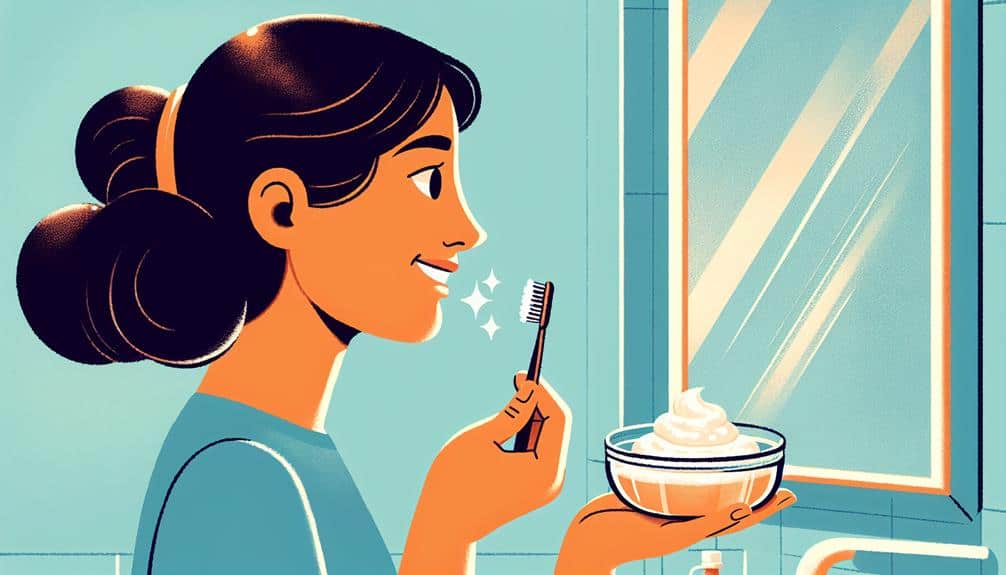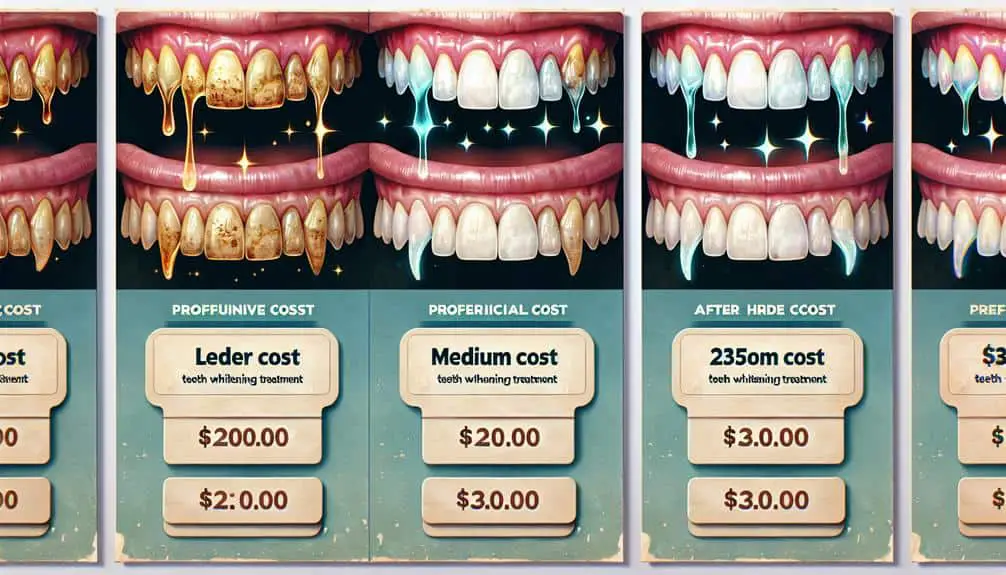Achieving a dazzling smile is possible by exploring various teeth whitening options that range from natural remedies like baking soda to professional treatments at dental offices. Whether you opt for cost-effective at-home kits or immediate results from in-office procedures, the key is to choose based on your budget, time commitment, and desired level of effectiveness. Understanding how teeth whitening works, the importance of enamel protection, and maintaining oral hygiene through regular brushing, flossing, and dental check-ups are essential for a bright smile.
Discover the benefits and considerations of different whitening methods to find what suits you best and eventually reveal the radiant smile you desire.
Key Points
- Use whitening toothpaste and at-home kits for accessible brightening.
- Consider professional treatments for immediate and effective results.
- Maintain oral hygiene with regular brushing, flossing, and dental check-ups.
- Avoid enamel damage by being cautious with whitening methods.
- Watch dietary choices to prevent staining and erosion for a radiant smile.
Benefits of Teeth Whitening
Enhance your smile's radiance with the numerous benefits that come with teeth whitening. When seeking to brighten your teeth, consider the cost-effective options and natural remedies available to you. Teeth whitening provides a quick and effective way to enhance your appearance and boost your confidence.
Cost-effective options such as whitening toothpaste and at-home whitening kits are readily accessible. Whitening toothpaste typically contains mild abrasives or enzymes that help remove surface stains. These toothpaste options are an easy and affordable way to maintain your teeth's brightness between whitening treatments.
Natural remedies like baking soda and hydrogen peroxide can also help whiten teeth. Baking soda, when used in moderation, can gently scrub away stains. Hydrogen peroxide, when diluted with water, can act as a natural whitening agent. Incorporating these natural remedies into your oral care routine can help enhance the effects of professional whitening treatments.
Professional Vs. At-Home Whitening
When deciding between professional and at-home whitening options, it's important to understand the differences in effectiveness and outcomes for achieving a dazzling smile. Professional whitening treatments are typically performed in a dental office, while at-home options involve using whitening kits or strips purchased over the counter. Here are some key points to take into account:
- Cost Comparison: Professional whitening procedures are usually more expensive upfront compared to at-home kits. However, the long-term results and expertise of a professional can sometimes justify the higher cost.
- Time Commitment: In-office whitening treatments are usually completed in a single session lasting about an hour, providing immediate results. At-home whitening kits require multiple applications over a period of days or weeks to achieve similar results.
- Effectiveness: Professional whitening treatments tend to be more effective in removing stubborn stains and achieving significant whitening compared to at-home options, which may result in more subtle changes.
Take into consideration these factors when choosing the best whitening option to achieve your desired dazzling smile.
How Does Teeth Whitening Work?
Teeth whitening works by utilizing bleaching agents to remove stains and discoloration from the surface of your teeth, revealing a brighter and more radiant smile. The key component in most whitening procedures is the whitening gel, which contains hydrogen peroxide or carbamide peroxide. These active ingredients penetrate the enamel and break down the stains into smaller molecules, effectively lightening the color of your teeth.
One vital aspect of teeth whitening is enamel protection. While the bleaching agents work to whiten your teeth, they can also temporarily weaken the enamel. To counter this, many whitening products include ingredients that help protect the enamel during the whitening process. Additionally, using fluoride-based toothpaste or fluoride treatments can aid in strengthening the enamel.
Understanding how teeth whitening works and the importance of enamel protection is essential for achieving a dazzling smile safely and effectively. By following recommended guidelines and using reputable whitening products, you can brighten your smile while maintaining the health of your teeth.
Common Teeth Whitening Methods
To achieve a brighter smile, individuals commonly utilize various methods for whitening their teeth. There are several options available, each with its own benefits and considerations:
- Natural Remedies: Some people opt for natural remedies like baking soda, activated charcoal, or hydrogen peroxide to whiten their teeth. These methods are often cost-effective and easily accessible, but it's important to use them cautiously to prevent damage to the enamel.
- DIY Kits: Over-the-counter teeth whitening kits are popular for at-home use. These kits typically include whitening gels or strips that contain bleaching agents like hydrogen peroxide. While DIY kits can provide noticeable results, it's vital to follow the instructions carefully to avoid sensitivity or uneven whitening.
- Professional Treatments: For more drastic results, individuals may choose to undergo professional teeth whitening treatments at a dental office. These treatments often involve stronger bleaching agents and can provide quick and significant improvements in tooth color. However, professional treatments can be more expensive than at-home methods and may require multiple sessions for the best results.
Maintaining Your Bright Smile
For long-lasting results and a dazzling smile, it's essential to establish a consistent oral hygiene routine that includes proper care and maintenance of your teeth after whitening treatments. To maintain your bright smile, focus on essential care by brushing your teeth at least twice a day with fluoride toothpaste and flossing daily to remove plaque buildup. Regular dental check-ups are vital for professional cleanings and identifying any issues early on.
In addition to your oral hygiene routine, be mindful of your dietary choices. Limit sugary and acidic foods and beverages that can erode tooth enamel and stain your teeth. Opt for teeth-friendly foods like crunchy fruits and vegetables that can help clean your teeth naturally. Drinking plenty of water throughout the day also aids in washing away food particles and keeping your mouth hydrated.
Frequently Asked Questions
Are There Any Age Restrictions for Teeth Whitening Procedures?
When contemplating teeth whitening procedures, age recommendations should be adhered to in order to guarantee safety. Professional advice is essential in determining suitable treatment options. Consult with a dentist for guidance on the most appropriate approach for your age.
Can Teeth Whitening Treatments Cause Sensitivity or Damage to the Teeth?
Teeth whitening treatments may cause sensitivity but rarely damage teeth. To mitigate risks, consult your dentist for precautionary measures. Maintaining good dental care practices post-treatment can help alleviate sensitivity and promote oral health.
Are There Any Natural Remedies for Whitening Teeth That Are Effective?
Looking to brighten your smile naturally? Consider trying home remedies like baking soda, activated charcoal, or oil pulling. These natural methods can help whiten teeth effectively without the use of harsh chemicals.
How Long Do the Results of Teeth Whitening Typically Last?
To maintain teeth whitening results, follow a consistent maintenance routine. Use whitening products as directed. Results typically last from 6 months to 2 years, depending on lifestyle habits and oral care practices.
Are There Any Foods or Drinks That Should Be Avoided to Maintain a Bright Smile After Whitening Treatments?
To keep your smile shining bright after whitening, avoid highly pigmented foods like berries and drinks like coffee that can cause stains. Opt for a straw with darker beverages for extra protection.




